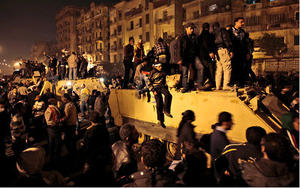Crisis in EgyptU.S., Egypt look to post-Mubarak era
The days of Hosni Mubarak in office appear numbered, and there are behind-the-scenes discussions among U.S., Egyptian, and Saudi diplomats about a “smooth transition”; it is not yet clear whether the efforts to ease Mubarak out are meant to allow the military regime which came to power in 1952 to remain in power, headed by more acceptable leaders than Mubarak, or whether these efforts are aimed at a more thorough revamping of the Egyptian political system; the main goal is to prevent a repetition of the Iran 1979 scenario: an authoritarian regime replaced by a centrist, secular — but weak and devoid of support — government, only for that government to be swept from power by the Ayatollahs within months

Even armor doesn't intimidate the Egyptians // Source: midd-blog.com
The days of Hosni Mubarak as president appear to be numbered, a high-ranking Egyptian diplomat on Sunday echoed U.S. calls in recent days, saying the primary goal of Mubarak’s regime at this point is an “orderly transition” of power. It is a phrase used repeatedly by the Obama administration in the past week.
“We want to see an orderly transition so that no one fills a void, that there not be a void, that there be a well thought-out plan that will bring about a democratic, participatory government,” Secretary of State Hillary Clinton told Fox News Sunday. “I also believe strongly that this is in Egypt’s long-term interest, it is in the interest of the partnership that the United States has with Egypt so that is what we are attempting to promote and support.”
The United States is “sending a very clear message” about an “orderly transition,” Clinton added. Such quick movement is needed to avoid “some takeover that would lead not to democracy, but to oppression and the end of aspirations of the Egyptian people.”
Fox News reports that as protests grow in capital Cairo and other Egyptian cities, many are looking at the end of the autocrat’s 30-year reign and whether it will come softly or harshly; immediately as a result of turmoil in the streets or a few months down the line through an “orderly,” even voluntary, process.
The diplomatic source, speaking to Fox News, said it is possible Mubarak could be driven from office, or the country, by street rioting, but the Egyptian president still maintains “normal” command over the military and the armed forces are executing all missions assigned them.
A swift announcement by Mubarak that he intends to step down after free and open presidential elections already scheduled for this September would allow the president to finish out his term and avoid prosecution by a subsequent Egyptian government.
It appears to be something the Obama administration may have already discussed with Mubarak in recent days.
“There is an action-enforcing event that is already on the calendar. Can there be efforts made to really respond to the political desires of the people so that such an election is free and fair and credible? There are many steps that can be taken,” Clinton told CNN’s State of the Union on Sunday.
Acknowledging Mubarak’s role in securing peace regionally over the past thirty years he has been in power, the secretary of state said for three decades Egypt’s president has promised but not delivered reform in his own country. She said the time has come to respond to the Egyptian people’s “legitimate grievances.”
“For thirty years, the United States, Republican and Democratic administrations, have been urging Mubarak to take certain steps. In fact, we have been urging that a vice president be appointed for decades, and that finally has happened, but there’s a long way to go,” Clinton told Fox News.
“We see a dialogue opening that reflects the full diversity of Egyptian civil society that has the concrete steps for democratic and economic reform that Mubarak himself said that he was going to pursue,” she added.
In Cairo, a Mubarak-imposed 4 p.m. curfew Sunday was reinforced with low-flying fighter jets meant to demonstrate the military’s control over the city.
A central square where thousands of protesters were calling for Mubarak’s departure was filled with the presence of army troops backed by tanks. Police also returned to the streets after nearly two days of absences that contributed to gangs of armed men freeing thousands of militants and other inmates from four jails, the burning of the ruling political party’s offices and smashed ATMs, cars and other property.
Though publicly understated, the Obama administration response has been ongoing. Sunday morning, Deputy National Security Adviser Denis McDonough chaired a deputies committee meeting to discuss the situation in Egypt. Later in the day, President Obama, who took his daughters to play basketball in the morning, received a briefing from members of his national security staff.
He also has been calling foreign leaders over the weekend, expressing the U.S. position and seeking input from European and Middle Eastern officials. The White House says that Obama has spoken with leaders from the United Kingdom, Turkey, Israel, and Saudi Arabia.
For its own citizens, the U.S. State Department authorized “voluntary departures” in which the U.S. Embassy in Cairo will assist Americans seeking to leave the country.
Roughly 50,000 Americans reside in Egypt. None has been killed or injured so far, Clinton said.
The U.S. response thus far has the support of Republican leaders.
